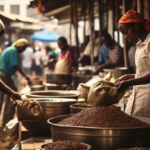You love coffee, but have you dived into its cultural roots? Did you know Ethiopia is where our beloved coffee began? This blog will take you on a journey through the heart of Ethiopian coffee culture, from ancient traditions to modern practices.
Get ready to be amazed!
Key Takeaways
- Ethiopia is the birthplace of coffee, a discovery dating back to the ninth century.
- The Ethiopian coffee ceremony is a symbol of friendship and respect, involving roasting beans and serving in small cups.
- Ethiopian coffee flavors are unique with floral, fruity notes due to factors like climate, soil, and altitude.
- Modern techniques in cultivation are impacting traditional practices but efforts are made to preserve them.
- Supporting Ethiopian coffee means helping over 12 million people involved in its farming maintain their culture.
The Birthplace of Coffee

Ethiopia holds a special place in coffee history, as it is believed to be the birthplace of coffee. The legend of the dancing goats and Ethiopia’s role in cultivating coffee have contributed to its rich cultural significance.
Ethiopia’s role in coffee history
Coffee history starts with Ethiopia. This land gave the world its first taste of coffee back in the ninth century. The discovery made a huge splash and transformed global culture and commerce.
As time passed, over 12 million Ethiopians became tied to coffee farming. Together they make sure this cherished bean reaches cups around the world.
The country’s beans traveled far and wide by the 13th century. They reached the Islamic world and changed lives there too. People saw coffee as more than just a drink; it was medicine and helped them stay alert during prayers.
Ethiopian roots run deep through every espresso, latte, or simple black cup we enjoy today.
The legend of the dancing goats
A long time ago in Ethiopia, a goat herder named Kaldi noticed something strange. His goats were full of energy after eating cherries from a certain bush. They danced and leaped around! Curious, Kaldi tried the cherries too.
Soon, he felt wide awake and full of life.
This discovery spread fast among the people. They found ways to use these coffee cherries to stay alert. Thanks to Kaldi’s dancing goats, we have the rich tradition of enjoying coffee today.
Now imagine sipping on that history with every cup!
The Ethiopian Coffee Ceremony

Experience the rich symbolism and cultural significance of the Ethiopian coffee ceremony, a traditional process that has been passed down through generations. From the roasting of green coffee beans to the intricate serving rituals, this ceremony is steeped in tradition and holds a special place in Ethiopian culture.
Symbolism and cultural significance
The Ethiopian coffee ceremony is much more than just drinking coffee. It’s a symbol of friendship, respect, and hospitality. In this ritual, the community comes together to chat, relax and enjoy each other’s company.
The hostess prepares the Jebena with care and skill, showing her guests how important they are.
Coffee in Ethiopia also stands for patience and appreciation of the moment. Roasting beans over an open fire fills the air with rich aromas that make everyone stop and savor life. As the coffee is passed around accompanied by popcorn or snacks, it unites friends and family in a shared experience that’s cherished across generations.
The traditional process
Moving from the symbolism and cultural significance to the traditional process, let’s delve into the intricate steps of an Ethiopian coffee ceremony:
- Freshly roasted coffee beans are shaken in a long – handled pan over a small fire.
- The aroma – rich beans are then carried around for guests to appreciate.
- The roasted coffee powder is added to a special Ethiopian clay pot with water and placed on the fire.
- This pot is heated multiple times until the coffee reaches boiling point.
- The brewed coffee is poured into small cups, ready for sharing and enjoyment.
Ethiopian Coffee Expressions
“Ethiopian Coffee Expressions” offers a glimpse into the cultural significance of coffee in Ethiopia, with traditional proverbs and sayings that reflect the deep connection between coffee and Ethiopian identity.
From “Coffee is our bread” to “Coffee and love taste best when hot,” these expressions reveal the central role of coffee in Ethiopian society.
“Coffee is our bread”
Ethiopian coffee lovers cherish the saying “Buna dabo naw” which translates to “Coffee is our bread,” encapsulating the integral role of coffee in their culture. This ancient proverb reflects how deeply intertwined coffee consumption is with daily life, social interaction, and hospitality in Ethiopian society.
The phrase underscores the cultural significance of coffee as more than just a beverage – it symbolizes nourishment, community, and tradition.
In Ethiopia, this expression goes beyond mere words; it embodies a way of life where sharing a cup of freshly brewed coffee fosters connections and strengthens relationships. Understanding this sentiment enriches your appreciation for Ethiopian coffee culture and its profound impact on communal bonds through shared experiences over steaming cups of richly aromatic brews.
“Coffee and love taste best when hot”
Transitioning from the significance of coffee as a staple to its emotional connection, Ethiopian culture holds the belief that “Coffee and love taste best when hot.” This proverb encapsulates the essence of sharing warmth and affection through every cup.
It reflects the cultural tradition where coffee is not just a drink but an experience woven into relationships. In Ethiopia, brewing and serving coffee becomes a cherished symbol of hospitality and love.
The saying embodies how in Ethiopian coffee culture, warm conversations blend with the aromatic brew, fostering connections and bonds among people. The sensory delight of sipping hot coffee also mirrors emotions – it’s comforting, invigorating, and brings people together over shared moments.
Flavor Profile of Ethiopian Coffee
Ethiopian coffee is known for its unique characteristics and captivating aroma. The flavor profile often includes floral, fruity, and sometimes wine-like notes, making it a favorite among coffee enthusiasts.
Factors such as the region’s climate, soil, and altitude contribute to the distinct flavors of Ethiopian coffee.
Unique characteristics and aroma
Ethiopian coffee is renowned for its unique fruity and floral aroma. The beans often possess a vibrant flavor profile with wine-like acidity, making each cup a delightful sensory experience.
When brewed, Ethiopian coffee releases enchanting aromas that reflect the rich cultural significance of this beverage in Ethiopia.
The distinct fruity and floral notes of Ethiopian coffee are what set it apart from other varieties around the world. The flavors are complex, showcasing the intricate nuances of Ethiopian soil and climate, creating an unparalleled sensory journey for coffee enthusiasts.
Factors that contribute to flavor
Soil composition, altitude, and climate greatly influence the flavor of Ethiopian coffee. The high altitudes and diverse microclimates contribute to unique taste profiles, while rich volcanic soils enhance the beans’ complexity.
Additionally, traditional cultivation methods like shade-growing preserve natural flavors and increase biodiversity.
The heirloom varieties of Arabica coffee are another pivotal factor in Ethiopian coffee’s distinctive taste. These indigenous plants have evolved over centuries and yield beans with complex flavor profiles ranging from fruity to floral with vibrant acidity.
New Techniques and Modernization
Discover how advancements in cultivation and processing have impacted traditional Ethiopian coffee culture, as well as the efforts to balance modernization with preserving the rich heritage of Ethiopian coffee.
Advancements in cultivation and processing
Advancements in cultivation and processing techniques in Ethiopia have revolutionized the coffee industry, enhancing the quality and diversity of Ethiopian coffee. Innovative methods such as natural processing and organic cultivation have contributed to the unique flavor profiles found in Ethiopian coffees, enticing with fruity notes and vibrant aromas.
These advancements also support sustainable practices, ensuring that coffee farming remains environmentally friendly while meeting the growing global demand for specialty coffees. The result is a rich tapestry of flavors that capture the essence of Ethiopia’s diverse landscapes and indigenous coffee varieties.
Preserving these traditional practices while embracing modern advancements has led to an exciting array of new coffee experiences for enthusiasts worldwide. From meticulously roasted single-origin beans to specialty blends crafted with precision, Ethiopian coffee continues to captivate with its timeless appeal, inviting you on a journey through centuries-old traditions harmonizing with innovation and sustainability.
Impact on traditional coffee culture
The advancements in cultivation and processing have led to an impact on traditional coffee culture in Ethiopia. The introduction of modernization and new techniques is altering the traditional methods of consuming coffee.
This shift raises concerns about preserving the authenticity and cultural significance of the age-old Ethiopian coffee ceremony, as well as its influence on various global coffee drinks and products.
As modernization continues to unfold, it is crucial to maintain a delicate balance between embracing innovation while safeguarding the unique heritage and rituals associated with Ethiopian coffee.
Preserving the Culture: Challenges and Efforts
Preserving the rich tradition of Ethiopian coffee culture faces challenges from modernization and globalization. Efforts and initiatives are underway to protect traditional coffee practices and promote Ethiopian coffee worldwide.
The challenges facing Ethiopian coffee culture, including modernization and globalization.
Modernization and globalization pose a threat to the traditional Ethiopian coffee culture, risking its overshadowing by modern production methods. Efforts are crucial to safeguard the unique coffee consumption customs from the influences of modern practices and uphold the rich heritage that has been an integral part of Ethiopian society for centuries.
With over 12 million people involved in coffee cultivation, preserving these age-old traditions is paramount to maintaining the authenticity and depth of Ethiopia’s esteemed coffee culture against the pressures of contemporary trends.
Efforts are needed to ensure that traditional practices such as consuming ground coffee in ghee and adding clarified butter to brewed coffee continue to thrive amidst growing modernization.
The enduring cultural significance embedded within these rituals must be protected from being diluted or lost, echoing Ethiopia’s long-standing relationship with its cherished beverage.
Efforts and initiatives aimed at preserving traditional coffee practices and promoting Ethiopian coffee.
Amid the challenges facing Ethiopian coffee culture, including modernization and globalization, efforts and initiatives are being undertaken to preserve traditional coffee practices and promote Ethiopian coffee. Here are some focused endeavors:
- Growing heirloom coffee varieties organically to maintain unique Ethiopian flavors while promoting environmental sustainability.
- Supporting fair trade coffee practices that ensure local farmers receive equitable compensation for their high-quality produce, encouraging economic stability within coffee communities.
- Promoting shade – grown coffee farming techniques to preserve biodiversity in coffee farms and mitigate the environmental impacts of deforestation.
- Implementing ethical coffee sourcing strategies that prioritize sustainable and responsible production methods and reduce water usage in coffee production.
- Educating local communities on the importance of preserving cultural rituals such as the Ethiopian coffee ceremony, fostering a sense of pride and appreciation for traditional practices.
- Collaborating with global partners to raise awareness of Ethiopian coffee culture through events, festivals, and various media platforms, enhancing its visibility on a broader scale.
- Encouraging direct trade relationships between international buyers and Ethiopian farmers, ensuring transparency in the supply chain and promoting long-term partnerships based on mutual respect and benefit.
- Investing in innovative storage techniques to maintain the quality of Ethiopian coffee beans throughout processing, preserving their unique aroma characteristics until they reach consumers.
- Supporting educational programs that equip future generations with the skills necessary for sustainable coffee farming, ensuring the continuity of Ethiopia’s rich coffee heritage.
The Artisanal Nature of Ethiopian Coffee
Emphasize the importance of craftsmanship and skill in Ethiopian coffee production, highlighting the impact of supporting local farmers and communities.
Importance of craftsmanship and skill
Craftsmanship and skill are crucial in the Ethiopian coffee ceremony, where each step is meticulously executed to create a rich and flavorful brew. From the careful roasting of beans to the precise grinding and brewing process using the traditional Jebena pot, every detail showcases the expertise and dedication of the artisans involved.
The result is an exquisite cup of coffee with unique characteristics and aromas, reflecting the mastery of those who have preserved these time-honored techniques for generations.
The artisanal nature of Ethiopian coffee highlights how craftsmanship and skill directly impact quality. Specialty Coffees like Horny Goat from Ethiopia Guji or Ethiopia Sidamo exemplify this, as their exceptional flavors are a testament to the meticulous care taken by local farmers in cultivating and processing these renowned beans.
Supporting local farmers and communities
Fostering the rich Ethiopian coffee tradition is about more than just a cup of coffee; it’s about supporting local farmers and communities. Over 12 million people in Ethiopia are part of the coffee cultivation process, making their livelihood from this ancient craft.
As a coffee enthusiast, by appreciating and savoring Ethiopian coffee, you contribute to the sustainability of these local farmers and their communities. The ceremonial practice at the heart of many villages not only celebrates the cultural significance of coffee but also serves as an important platform for socializing and supporting local farmers.
Conclusion
The enduring cultural significance of Ethiopian coffee is undeniable, and its rich history and traditions continue to shape the country’s identity. As a coffee lover, learning about and appreciating the Ethiopian coffee culture can open your eyes to the artistry and craftsmanship behind every cup, as well as inspire you to support the preservation of this cherished tradition.
The enduring cultural significance of Ethiopian coffee
Ethiopian coffee holds deep cultural importance, tracing back to the ninth century as the birthplace of this beloved beverage. Rich traditions are intertwined with every cup, reflecting in local expressions and sayings like “Coffee is our bread” and “Coffee and love taste best when hot.” The Ethiopian coffee ceremony embodies this significance, symbolizing community unity and hospitality through a meticulously traditional preparation process.
As you savor your Ethiopian brew, understand that each sip encapsulates centuries of heritage and social connection unique to this African nation’s rich coffee culture.
Encouraging appreciation and preservation of the tradition.
Embrace the rich Ethiopian coffee culture by exploring its traditions and ceremonies. Support local farmers and communities to preserve the artisanal nature of Ethiopian coffee. Join in efforts to promote traditional coffee practices, ensuring that this cherished cultural heritage endures for future generations.
Immerse yourself in the unique flavor profile of Ethiopian coffee and become part of a global movement aimed at preserving this essential aspect of Ethiopia’s vibrant cultural tapestry.
FAQs
1. What makes Ethiopian coffee culture special?
Ethiopian coffee culture is known for its traditional brewing methods, like using a jebena, and the symbolic coffee ceremonies that bring communities together.
2. How do Ethiopians traditionally brew their coffee?
In Ethiopia, people brew coffee in a clay pot called a jebena after roasting green beans and grinding them by hand.
3. Can modern methods be found in Ethiopian coffee processing?
Yes, while traditions are strong, some Ethiopian producers use modern techniques to wet process and ferment beans, improving quality and sustainability.
4. Why is preserving the Ethiopian coffee culture important?
Preserving the Ethiopian coffee culture keeps unique rituals alive, honors craftsmanship in production, and maintains the community’s role in enjoying and sharing coffee.
5. How has globalization affected Ethiopia’s coffee industry?
Globalization brings challenges like climate change but also opportunities through innovation in farming and new markets to share Ethiopia’s rich artisanal coffees with the world.
6. Are there ways to enjoy Ethiopian Coffee outside of Ethiopia?
You sure can! Globally, you’ll find direct trade coffees for tasting or cupping events promoting barista skills – all celebrating Ethiopia’s prized flavors through tourism or subscription services.






